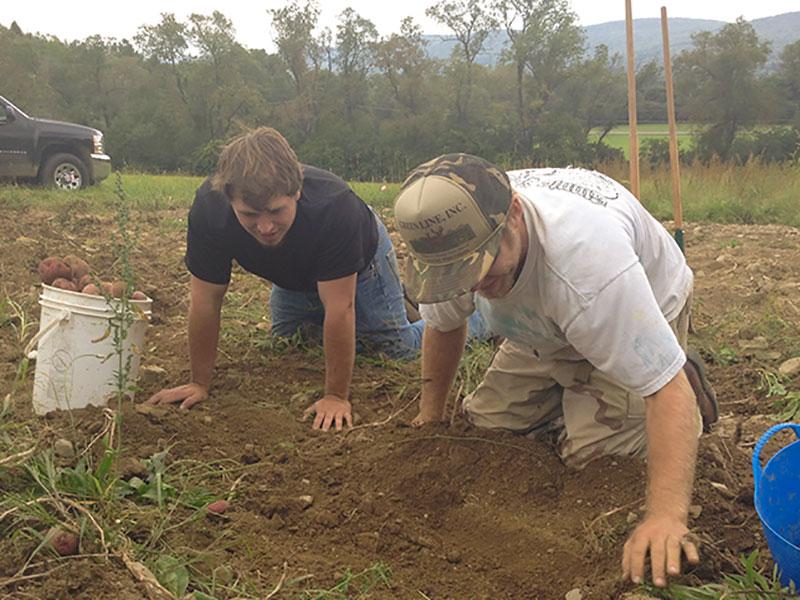Tompkins Cortland Community College has launched its two newest degree programs — sustainable farming and food systems and culinary arts — this semester, but the setup for these programs is not complete.
The college began offering these two majors as part of its Farm to Bistro program, which will implement the existing studies of wine marketing and hotel and restaurant management. The plan is to open Coltivare, a restaurant and event center located at 235 S. Cayuga St. in Ithaca that brings together all four disciplines of the program.
However, the construction of Coltivare has been pushed back to late November due to construction delays.
“You have to be timely, and you have to be punctual,” Susan Stafford, associate professor of hotel and restaurant management, said. “Doing things right means more six months from now, than if we hurried up and just opened.”
The program is adjusting to these delays and is set to open its learning labs inside Coltivare on Oct. 1, she added.
In the meantime, the culinary arts students are beginning their education learning about safety and sanitation. The students will be required to pass a national exam Sept. 27 administered by the National Restaurant Association before being allowed to operate in the food labs.
Students in the sustainable farming and food systems program have already begun collecting crops on the farm. The program was given six acres of land adjacent to the college’s campus to cultivate its produce. A cool and wet summer has not made any particular crops ideal, but the goal of the program is to teach students to adapt to their surroundings, farm director Todd McLane said.
“It was a good example to see that no matter how planned you are, you have to get the crops in the ground, but you still have all these factors out of your control that you have to deal with,” McLane said.
Like the culinary program, the sustainable farming program has had its share of setbacks as well. McLane said the college has not finished building a geothermal-heated barn that will provide classrooms and wash stations. The program also wants to install a greenhouse to implement year-round growing.
But even without this technology at their disposal, McLane said, it is beneficial for first-year students to experience how to begin building a brand new farm.
“They are seeing a farm grow from ground zero. We have very little infrastructure, and we’re building it while they’re here. A year from now the farm’s going to look completely different, and they’re going to have a huge role in that change,” he said.
At the same time, the Farm to Bistro program is supplementing some students’ future endeavors. First-year farming student Aidan Hodges, who had worked with McLane at West Haven Farm in Ithaca, said he has already developed a five-year farming plan and plans to buy land in central New York after he finishes the program.
“There’s a good market in New York for organic produce,” Hodges said. “People are actually interested, whereas there are plenty of places where you go where nobody wants to buy anything from a farm stand, or nobody goes to the farmer’s market.”
The farming program has also received help from community partners who have provided McLane and his students farming equipment like a tractor to plow the land and stations to wash and store their produce.
“I’ve been stressing to my students that farming doesn’t have to be so isolating. It’s really beneficial to lean on your community and your colleagues because when you’re starting up you might not have everything you need,” McLane said.
Though the program is just in its early stages, the farm is expected to adapt to different situations each year. Kelly Wessell, professor of biology and advisor for sustainable farming students, said these changes will be important for the evolution of the program.
“As the students come in and express their needs and interests, things will change to fit the students in the program,” Wessell said.
Similarly, the culinary program will be constantly fluctuating as each semester advances. Emilie Holmes, a second-year hotel and restaurant management student, said she hopes the Farm to Bistro program will give her a more well-rounded education experience.
“Being able to take these classes gives me a whole new perspective, and it gives a better idea of restaurants because we’ve been mainly focused on hotels,” Holmes said.
Taylor Reid, a first-year adjunct instructor at the college, teaches seminars with students from both the farming and culinary arts programs. He said both farming and culinary students can learn values and skills from one another despite being in different programs.
“As they go through these programs, they do it in a way that they’re thinking more,” Reid said. “The culinary are students are thinking more about the products that they’re using and how they’re grown, and the farming students are thinking about the products that they’re growing and where they’re going to end up.”







